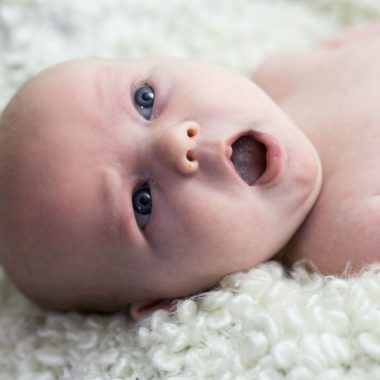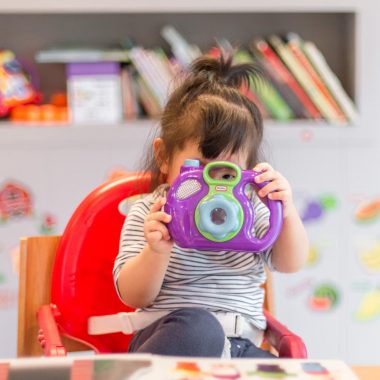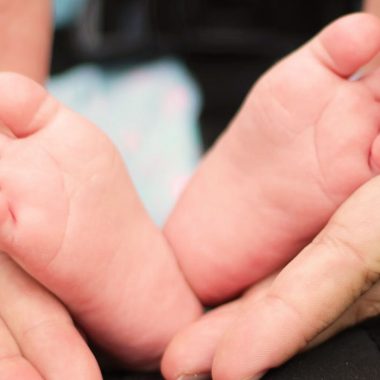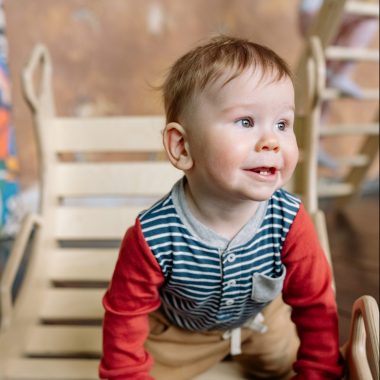Teething is another important milestone in a baby’s life. It is when a baby’s teeth begin to come through their gum line.
The timing of teething varies widely from baby to baby. But it’s a known fact that teething happens at the same time that a baby’s immune system is developing – meaning they are vulnerable to illnesses. This leads to confusion around what’s a symptom of teething and what’s not.
The first teeth of a baby are very important for their health. They help the baby with
- eating solids
- speech development
- self-esteem.
So providing added care for a baby’s first teeth is so important.
Read on to learn about when your baby may start teething, the signs and symptoms of teething, and gentle remedies.
When do babies start teething?
There is no exact time for when a baby starts teething. The appearance of the first teeth may vary quite a bit from baby to baby.
Most babies get their first tooth around 6 months pf age. However, some babies’ first tooth appears as early as 3 or 4 months, while others don’t get their first tooth until around or after their first birthday. So don’t worry if your baby’s teeth come in at different times.
Teething usually starts with the lower front teeth and continues until 30-36 months of age when the last molars appear.
All 20 baby teeth (10 on the top jaw and 10 on the bottom) usually arrive by the time the child is 3 years old.
What are the symptoms of teething?
For some babies, teething doesn’t cause any pain or discomfort. In fact, parents might not even realize that their baby is teething until they see the first sign of a tooth.
But for some babies, teething can be uncomfortable and may upset them. Even before a tooth appears, some changes in the baby’s behavior may be noticed.
Common signs and symptoms of teething may include:
- Drooling
- Face rash from drooling
- Chewing on different objects
- Irritability and crankiness
- Crying
- Refusing to eat
- Swollen, sore, or tender gums
- Trouble sleeping
- Flushed cheeks
- Pulling on ears
- Slightly elevated temperature to around 99°F (37.2°C)
Teething is not an illness. However, some teething symptoms may exhibit as symptoms of illness.
Aside from being mindful of your baby’s health during teething, watch out for symptoms such as coughing, rashes, diarrhea, vomiting, seizures, or high fever. If you notice these symptoms, see your pediatrician.
What is normal during teething?
Some symptoms that are completely normal for babies during teething are:
- Fussiness
- Trouble sleeping
- Irritability
- Loss of appetite
- Excessive drooling
- Slightly raised body temperature but not fever
What is not normal during teething?
Some symptoms are nor related to teething. These include:
- Fever
- Diarrhea
- Rash
If your baby has any of these symptoms while teething and continues to be cranky and uncomfortable, get in touch with your pediatrician.
Which teeth emerge first?
Each baby is different so the timeline for teething and which teeth emerge first varies. But typically, two bottom front teeth come in first. These are followed by the two top front teeth.
According to the American Dental Association (ADA), baby teeth tend to emerge within the first 6–8 months of life.
The ADA provides the following timeline of the typical ages at which baby teeth emerge:
Age | Teething timeline |
6-10 months | lower central incisors (bottom front two teeth) |
8-12 months | upper central incisors (top front two teeth) |
9-13 months | upper lateral incisors (at either side of the central incisors) |
10-16 months | lower lateral incisors (at either side of the central incisors) |
13-19 months | upper first molars (behind the upper canines) |
14-18 months | lower first molars (behind the lower canines) |
16-22 months | upper canines |
17-23 months | lower canines |
23-31 months | lower second molars |
25-33 months | upper second molars |
No sign of any tooth appearing at about 6 or 7 months of age is usually no cause for concern, as per the American Academy of Pediatrics (APA).
By the baby’s first birthday, they should see a dentist, whether or not they have teeth yet.
How long does teething last?
The duration of teething varies. At some point between the second and third birthdays, your baby will have a full set of 20 primary teeth.
This points to the fact that the teething process might last about 2 years.
How many baby teeth will appear in total?
The first set of baby teeth is known as primary or baby teeth.
By the time a baby is 2-3 years old, they will have a full set of 20 baby teeth.
When a child is around 6-7 years old (this also varies from child to child), their baby teeth will begin to fall out, making way for permanent teeth.
It takes time for all 32 permanent teeth to come in. For a while, your child will have both primary and permanent teeth.
How to help with a baby teething?
Not every baby feels uncomfortable during the teething period. But for some babies, the teething period can be highly uncomfortable.
Below you will find some tips to ease your baby’s discomfort during teething. Consult your doctor first for any remedies to ease your baby’s pain.
- Provide a rubber teething ring to satisfy the urge to bite or chew.
- Keep the teething ring chilled to soothe your baby’s gums.
- Gently run a cool, clean facecloth or the back of a cold spoon along your child’s gums.
- Rub your baby’s gums occasionally to help prevent cheek rubbing and ear-pulling.
- Spend more time comforting your baby. You can hold them for longer, take them for a walk, sing them a song, play some relaxing music, etc.
- Massage your baby’s gums using clean fingers.
- Apply a barrier cream or moisturizer to their cheeks to help prevent a rash.
- Keep the area around the mouth, cheek, and neck as clean and dry as possible to prevent skin irritation.
What teething remedies should you avoid?
While you may be ready to accept any relief for your baby’s teething pain, there are a few remedies that aren’t safe and should be avoided.
Numbing agents
Never use rubbing alcohol, benzocaine, or lidocaine on your baby’s gums. When choosing soothing gels, carefully read the ingredients before applying them to your baby’s gums. These ingredients can put children under age two at risk of reduced oxygen levels in the blood.
Over-the-counter teething gels
U.S Food and Drug Administration (FDA) says parents should avoid any OTC teething remedies, including herbal or homeopathic teething gels since they haven’t been proven to work. Some may contain an ingredient called belladonna that can cause difficulty breathing and even seizures.
Amber teething necklaces
There’s no medical evidence to suggest that amber teething necklaces work. Most pediatricians advise against them because they pose a choking or strangulation hazard. But if you do choose to use one, make sure to:
- Put it on your baby’s wrist or ankle, not around their neck.
- Always watch your baby when they wear it.
- Take it away when you aren’t watching your baby, even if for a very short time.
Pacifiers
Pacifiers can provide your baby with relief and comfort during teething. But avoid dipping your baby’s pacifier in honey, jam, or grape juice. This can increase the risk of early tooth decay.
How to care for your baby’s new teeth?
Oral health plays an important role in the overall health of your child. Therefore even before your baby has teeth, you should give due care to good oral hygiene.
- Until their teeth come in, clean your baby’s gums with a wet washcloth or piece of gauze at least once a day.
- Once your baby starts teething, clean their mouth the same way at least twice a day, especially after feedings.
- After their first birthday, you can use a soft-bristled baby toothbrush with water and a small amount of fluoride-free toothpaste.
- Do not disregard dental visits. Regular dental checkups are crucial for the healthy development of your baby’s teeth, mouth, and gums. The American Dental Association and the American Academy of Pediatric Dentistry recommend scheduling a baby’s first dental visit at or near their first birthday.
References: mayoclinic.org, webmd.com, healthline.com, medicalnewstoday.com, mouthhealthy.org, seattlechildrens.org, nct.org.uk, whattoexpect.com, pregnancybirthbaby.org.au, healthychildren.org,










